| BrianRxm | Coins on Television | 69/129 |
| Law & Order - Survivor (1996) |
Ancient Roman Cleopatra coins, Weimar Commemoratives, Nazis, Karen Allen
| Prev | Back | Next |
This episode of the television program "Law & Order" is about the murder of a rare coin dealer
and the search for a group of rare coins which disappeared during World War II.
"Law & Order" was a one-hour television program which ran on the NBC television network
from 1990 to 2010.
This episode is titled "Survivor" and was originally broadcast on October 23, 1996.
The story is set in New York City where the murder of a rare coin dealer is found to involve a hunt
for a set of rare ancient coins which began before World War II.
The investigation includes Swiss banks, Jewish survivors of the Nazi period, and wealthy businessmen.
The program does not have any pictures of coins, but several types of coins are mentioned,
including "Roman Cleopatras", "Dutch ducatoons", "Maximilians", "Athenians", "Corinthian staters",
and "Weimar Commemoratives."
The story may have been inspired by two of the "Indiana Jones" films, "Raiders of the Lost Ark" and
"Indiana Jones and the Last Crusade."
Both this program and the two films involve gold, treasure, ancient Egypt, Nazis, and obsessed hunters.
Karen Allen appeared in the first Indiana Jones film, here she hunts treasure by herself.
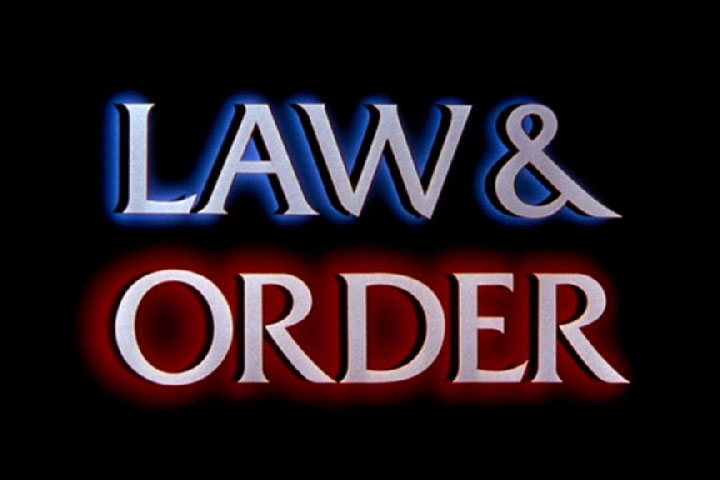
1. Program title
A young couple is walking and arguing along a Manhattan street.
They look into the window of an antiques gallery and see something unusual.
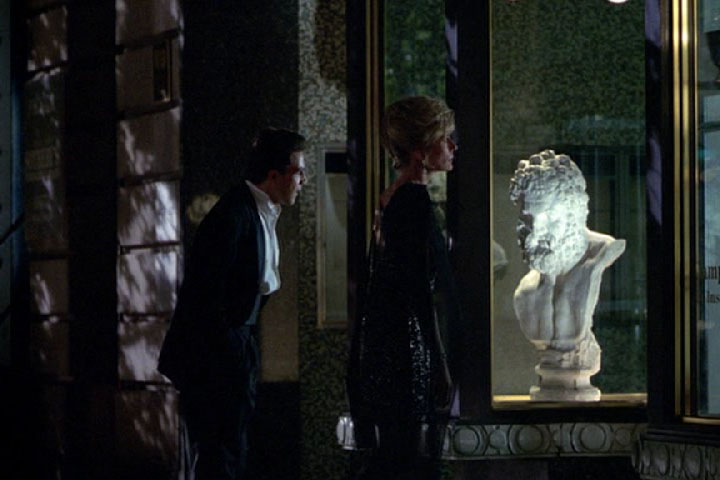
2. Couple looking in window
They run to a car and ask the driver to call 911.
Later, in the store, a policeman is showing two detectives around.
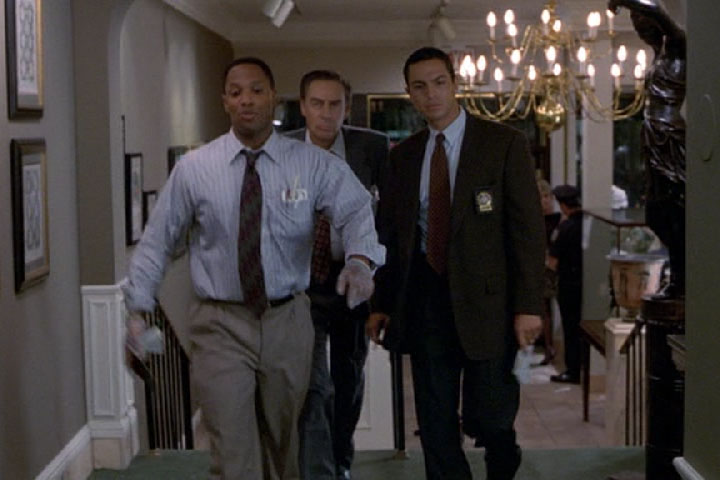
3. Detectives arrive
The two detectives are Lennie Briscoe and Rey Curtis.
They look around the store and at some of the coins and antiques on display.
They find no sign of forced entry.
The policeman explains that the place sells old coins, antiques, and statues.
Briscoe facetiously asks "how about a '56 Willie Mays?" (A baseball card).
The policeman replies "nothing that good."
The deceased is Stephen Campbell, 50 years old, the owner, who was killed around 10:00pm.
Curtis asks if a broken green glass Tiffany lamp was the weapon.
Briscoe, points to a stone item, it was more likely this.
Pointing to some empty spaces in a coin tray, a detective says that the killer took souvenirs.
Briscoe asks why the thief did not take a not take something more valuable like a
gold "Anno Domini 1742" coin on display.
Curtis replies that thief was probably a junkie.
The detectives leave to see Mrs. Campbell, the widow.
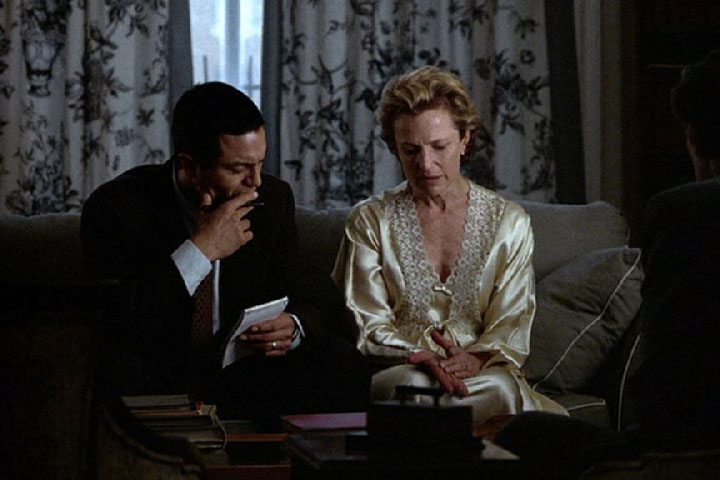
4. Curtis and Mrs. Campbell
She states that she was worried about the gallery, then Curtis asks
her if she knows of anyone who might have wanted to hurt the husband.
She replies that "Stephen was a businessman, he loved old coins,
he dealt with coin people, not murderers."
She didn't know of any late appointments and suggests that they contact Nancy Farber,
Campbell's assistant.
Apparently Campbell does not always tell her what he does after hours.
Farber tells the detectives that there is an inventory.
She notes that the most valuable items, some rare Dutch ducatoons, are still in their glass case.
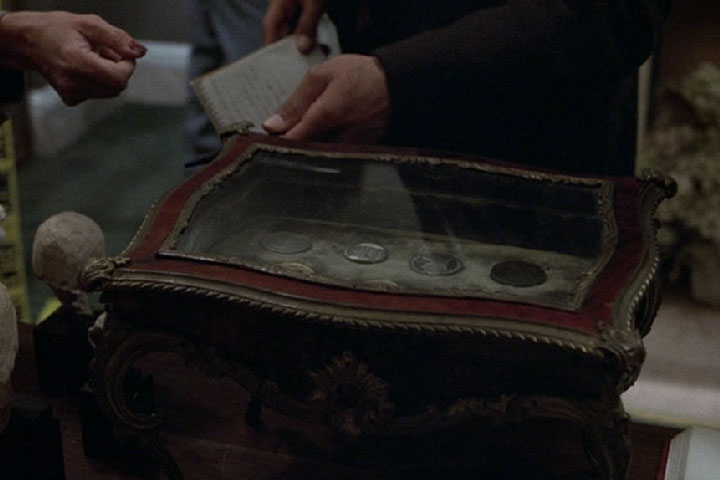
5. Glass case with Dutch ducatoons
She does notice that some Weimar commemoratives are gone, worth maybe $2,000 total.
A "Weimar Commemorative":
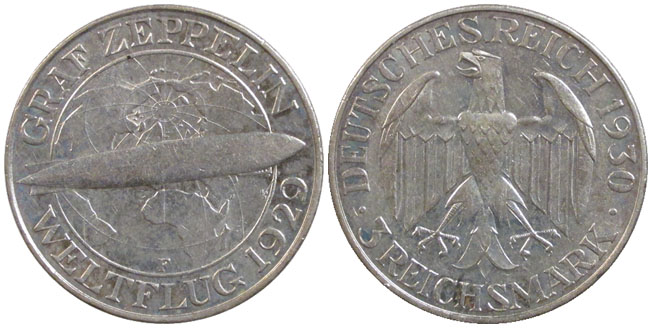
6. Germany Commemorative 3 Marks 1930 - Zeppelin World Tour
The German Weimar Republic lasted from 1918 to 1933.
This coin commemorated the 1929 Zeppelin around-the-world flight in August of 1929.
Back to the program:
Farber shows the detectives three "Maximilians", which are worth $10,000 each.
Briscoe asks "Brother, can you spare a Maximilian?"
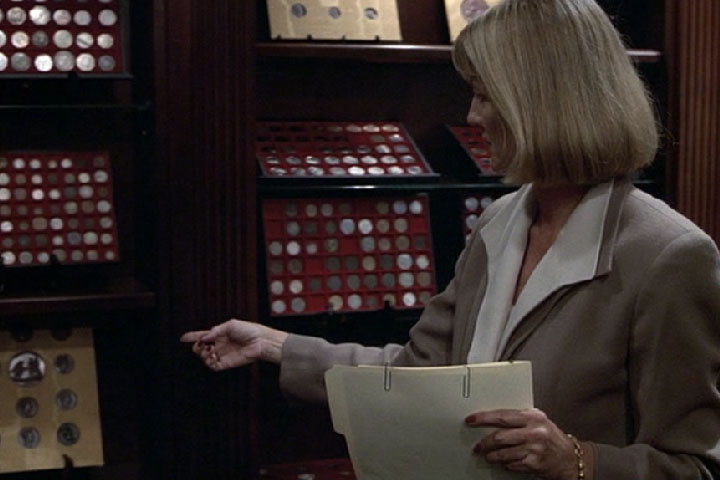
7. Nancy Farber points to trays full of coins
Farber states that there should 40 coins on consignment from Richard Peterson, a wealthy
businessman and coin collector.
(The Richard Peterson character may have been based on a Los Angeles ancient coin dealer who
became a film producer and in 1993 pled guilty to fraud and was sent to prison)
Briscoe asks if the Richard Peterson is the guy who rented out Giants Stadium.
Farber answers yes and that Peterson and Mr. Campbell did a lot of business together.
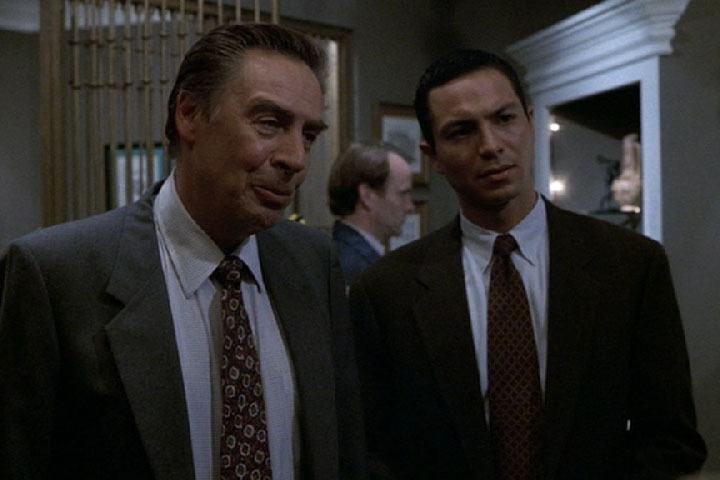
8. The detectives in the gallery
Farber lets the detectives know that Campbell had a girlfriend,
"there was a woman, some kind of aristocrat."
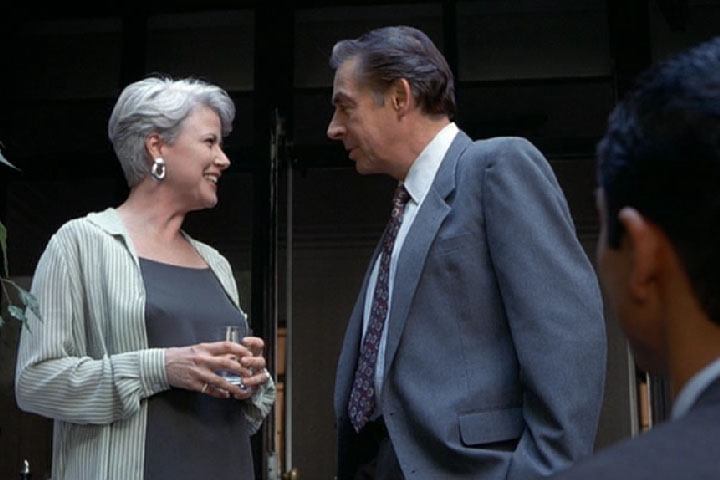
9. The Contessa of Alto Perugia
Briscoe, noting the woman's Southern accent, asks her if she is the "Contessa of Alto Perugia?"
She's from South Carolina, her late husband, the count, was from Italy.
She complains that the Italian government took his family's property years ago and
that she is still negotiating with the consulate trying to get it back.
"I've always been a fool for a man who could make me laugh."
Campbell was supposed to see her but called and cancelled as something came up at the gallery.
Peterson called looking for Stephen and she says that he is a friend also.
The detectives head over to the high-rise building office of Richard Peterson,
the millionaire businessman and coin collector.
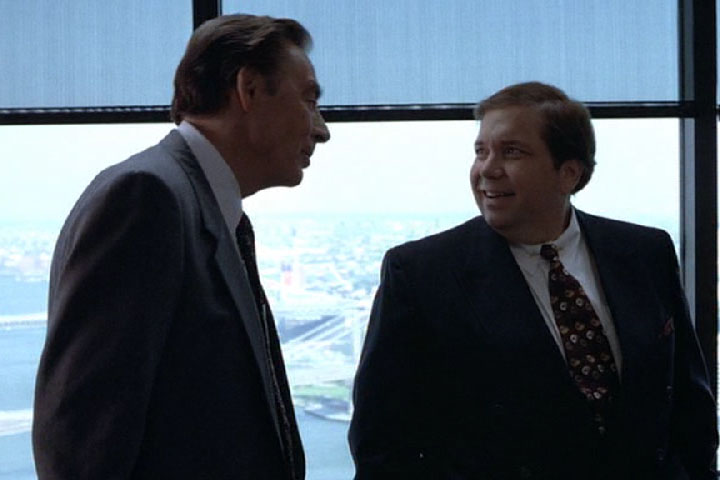
10. Briscoe meets Peterson
After introductions, Peterson admits that he spoke to the Contessa.
Curtis asks "what, you and Campbell shared her?"
Peterson wants to post reward, not to get his coins back but to catch Stephen's murderer
as he was a friend, "we had fun together."
Briscoe asks "what, you and him and the Contessa?"
Peterson replies "golly no. collecting coins."
Peterson has trays of ancient coins in his office and on his desk.
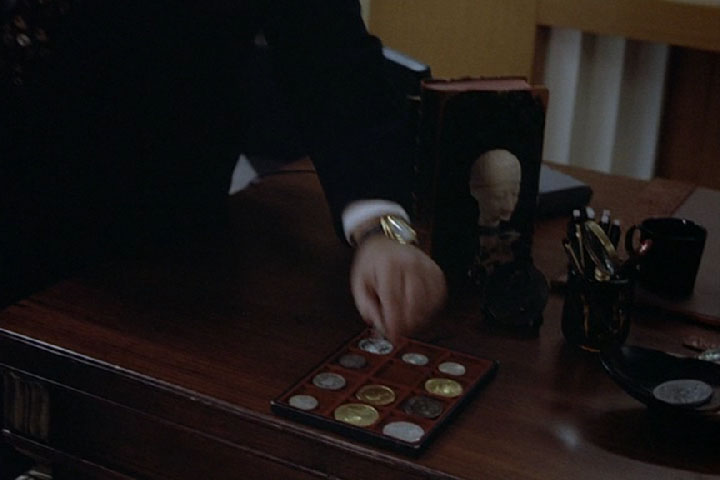
11. Peterson has a tray with ancient coins
Peterson picks up a silver coin from a tray to show to the detective.
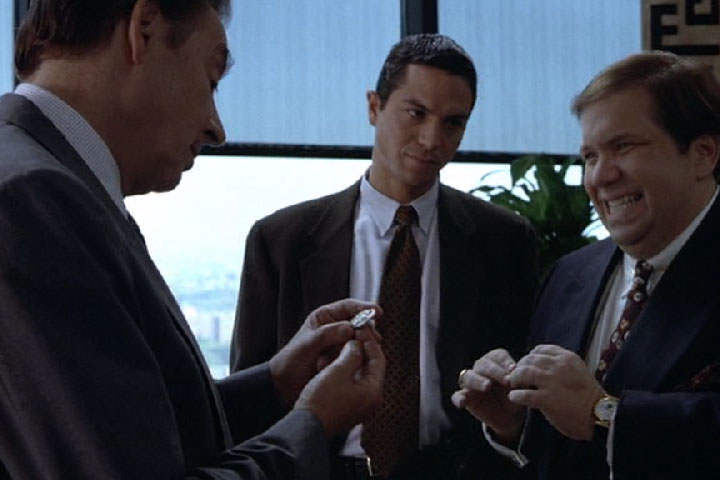
12. Peterson hands coin to detective
"Here, touch this. feel that."
"Plato might have bought lettuce with that coin."
"Pericles may have had his sandals fixed, hired a prostitute, bought a slave..."
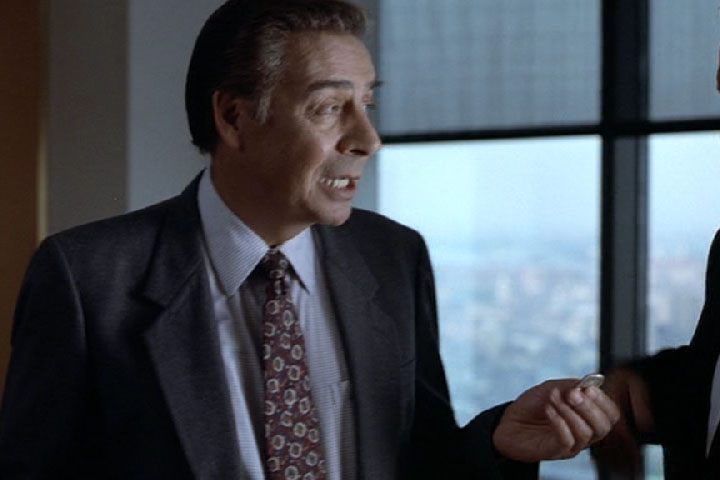
13. Briscoe, "Bribed a cop"
Peterson tells that his whole business started with coins, Lincoln pennies in the third grade,
then in high school, he was the "fat kid at the coins show at the Hilton."
He bought his first building using Alexandrian tetradrachms as collateral.
Curtis asks if the coin he is holding is like the ones Campbell was keeping for him.
Peterson replies that no, Stephen had his prize Greeks and Romans.
"Constantines, Cleopatras, Alexander the Greats, in superb condition."
His assistant Audrey appears and he asks her to bring an insurance list of the coins.
Peterson is insured, but Peterson wants the coins not the money.
"These coins, they're like my children."
Briscoe wonders "how many people knew you'd adopted them?"
A Homage Magazine did a profile on Peterson when he launched his airline,
stated that banks vied to loan him money, and had details about his coin collection.
The detectives head back to their precinct office.
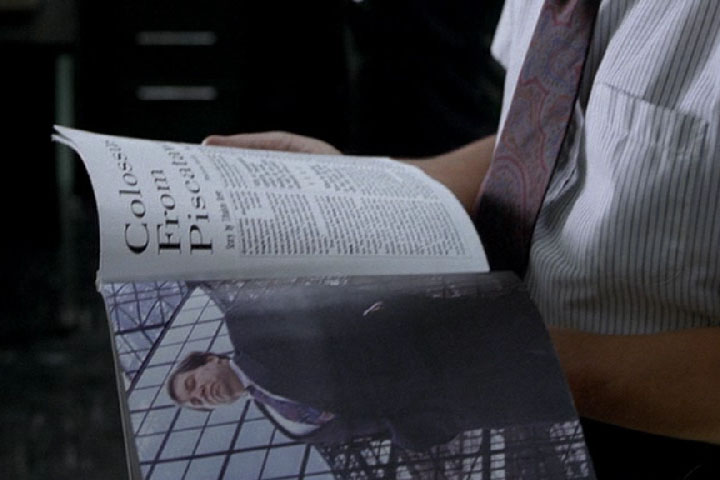
14. Briscoe looks at the magazine
Briscoe quotes from magazine,
"with an unquenchable appetite, Peterson scours the world,
looking for new jewels to add to his already estimable crown"
The detective chief Lt. Anita Van Buren comes in and Curtis tells her that
Campbell let somebody in who was mad enough to bust his head open.
Briscoe adds that the coins are described in the article and Campbell is mentioned several times.
Curtis then replies that Campbell is a coin dealer, who would open the door to a potential customer.
The detectives contact Campbell's assistant to get list of who's been browsing the shop.
The first name is Chad Markham, a businessman.
The detectives meet a teenage boy who tells them he is the businessman's son, also named Chad,
he is a coin collector, and that he was at gallery looking at coins.
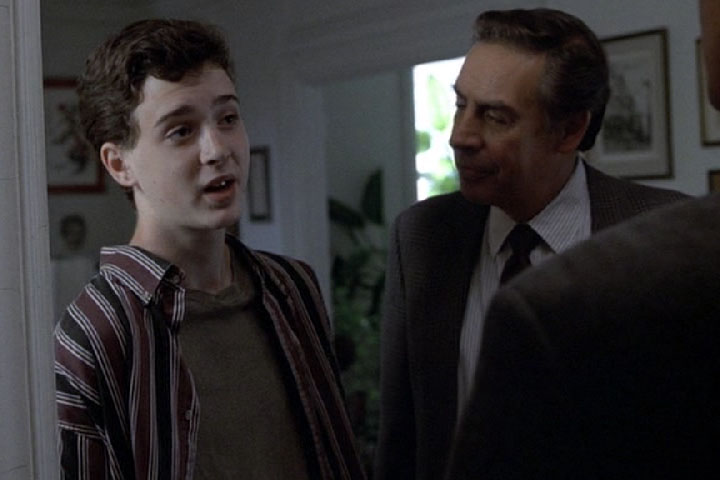
15. Chad Markham
He collects coins, mainly silver Athenians, but a few Corinthian staters.
He wanted to see the Peterson collection because they were supposed to be the best
Athenians anywhere, but never got to see them as Campbell said they were out being appraised.
Next on the coin store browser list is Judith Sandler, an art restorer,
whom they visit while she is working on a painting.
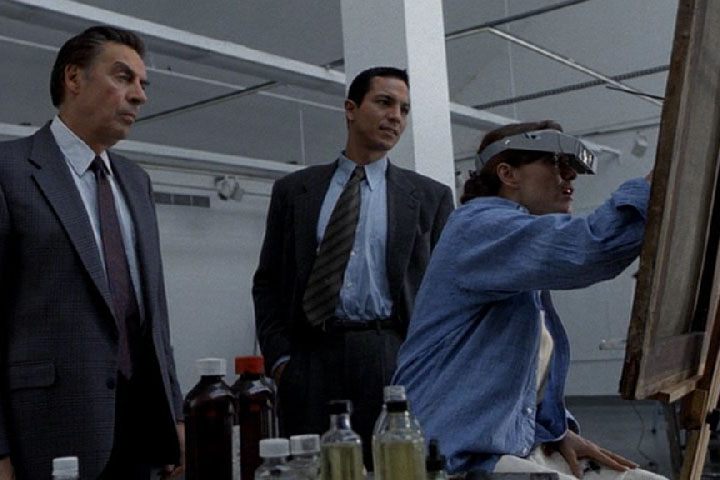
16. Judith Sandler, art restorer
Sandler asks the detectives to wait for to finish some work, or
"this cherub will have three wings."
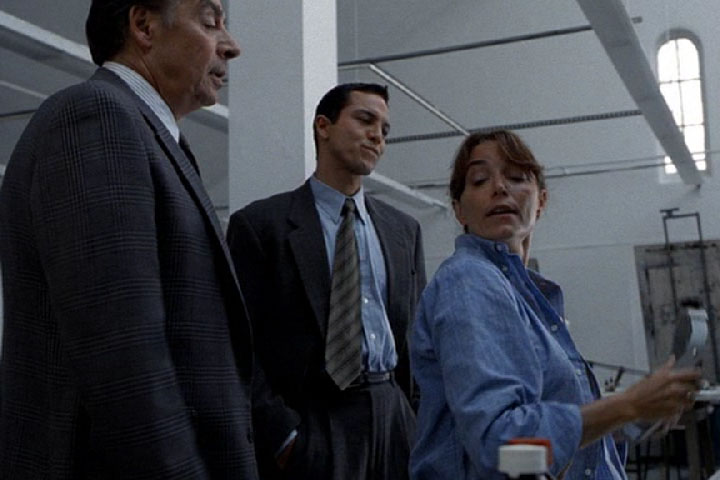
17. Judith Sandler, unmasked
Briscoe asks her if she painted the picture, she sarcastically replies
that her name is not Corregio, and she didn't die in 1534.
Briscoe asks her about her visit to the Campbell gallery, she tells him that
she went looking for some "17th century Ferdinand and Isabellas"
that Campbell had advertised, which means that she apparently collects coins.
(This statement is going to send up a red flag with real coin collectors)
She didn't buy them as Campbell wanted too much for them and that she would wait for an auction.
She didn't see the Petersen Greek and Roman coins because Campbell said they were out
with a potential buyer, a Mark Lehmann.
The detectives head to the yacht harbor to visit Mark Lehmann on his yacht.
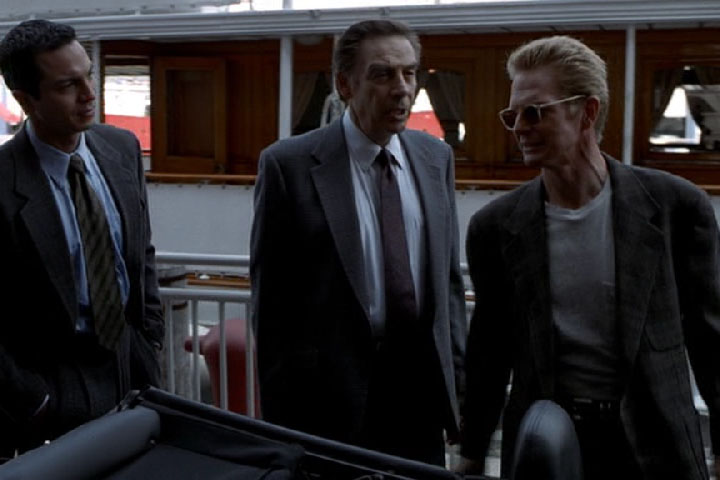
18. Detectives and Mark Lehmann at yacht harbor
Lehmann tells the detectives that he buys rare coins to have "bragging rights."
But Peterson told Lehmann that he sold them to a Korean who wanted to
"rub it in the nose of the Japanese."
He adds "I get horny just thinking about those babies."
Briscoe replies "yeah, little cold pieces of metal turn me on, too."
Lehmann continues to explain "look, those coins are classics.
they're works of art and antiques and rare and intrinsically valuable."
The detectives return to visit Peterson at his office.
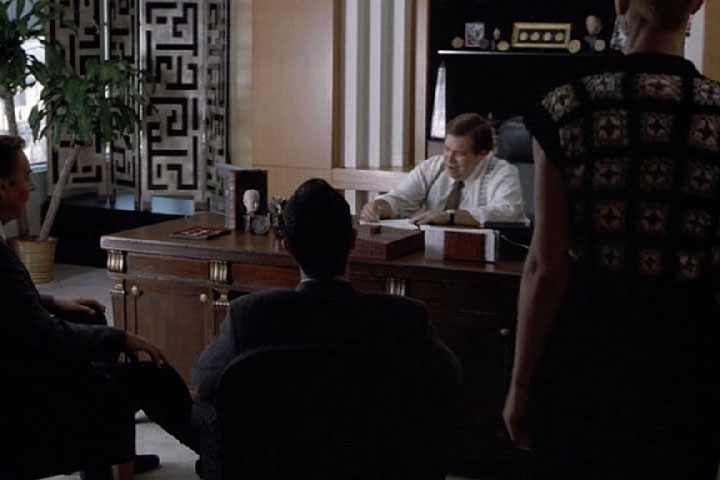
19. Peterson at his desk
The detectives ask about the Korean buyer story Lehmann told them.
Peterson makes an excuse for Campbell, that he figured that the dealer used an excuse
because he did not think Lehmann was a serious buyer.
For the first time, Peterson states that he used the collection as part of
collateral with a bank for a loan to buy an airline.
Back in the precinct office, the detectives tell their chief, Van Buren,
that Campbell was making various excuses to people for not showing the Peterson coins.
The police believe that the Peterson coins were stolen from the dealer.
Briscoe wonders how the thief would have disposed of the coins,
"those aren't the kind of goods you just sell to Vinnie the fence."
Curtis remembers a case where a mob hijacked a truck, found three Picassos,
and took them to expert.
The detectives head for a rare coin auction house, ACM Auctioneers.
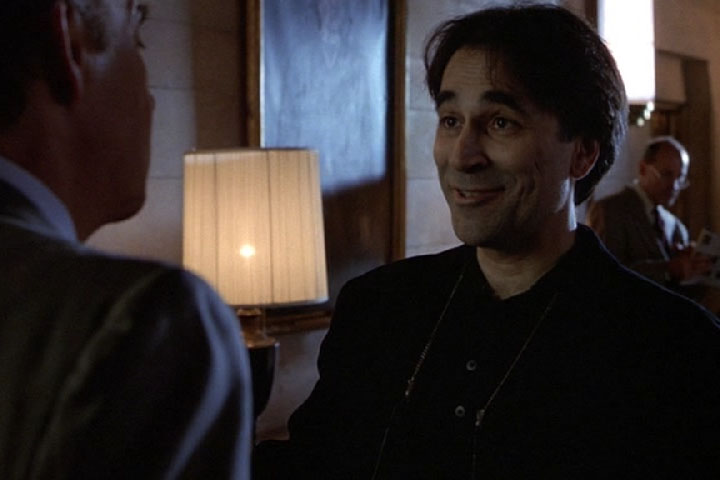
20. ACM Auctioneers expert
The expert tells Briscoe that he hasn't heard anything about the Peterson coins since the robbery.
He adds that Campbell short of money, a few months ago he had an auction for gold Napoleons,
he expected big money for them but the coins did not sell.
The detectives make a return visit to Mrs. Campbell.
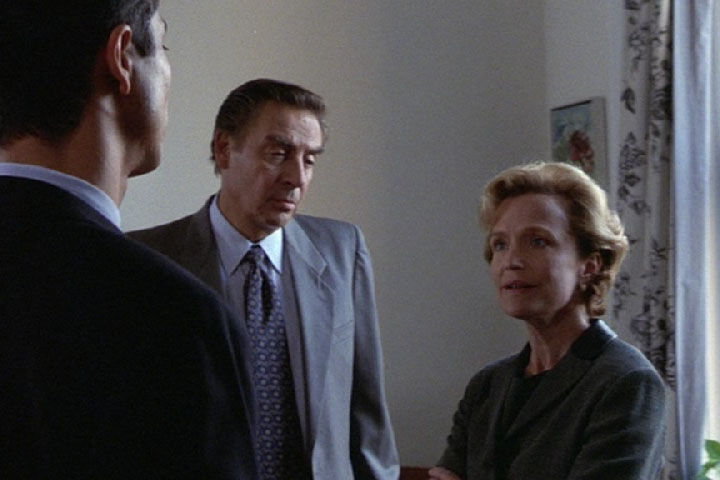
21. Detectives talk to widow about Napoleons
She tells them that Stephen found the Napoleon coins in Brussels, and that a month before the auction
a French frigate was salvaged off Martinique loaded with gold Napoleons.
The detectives visit Campbell's accountant.
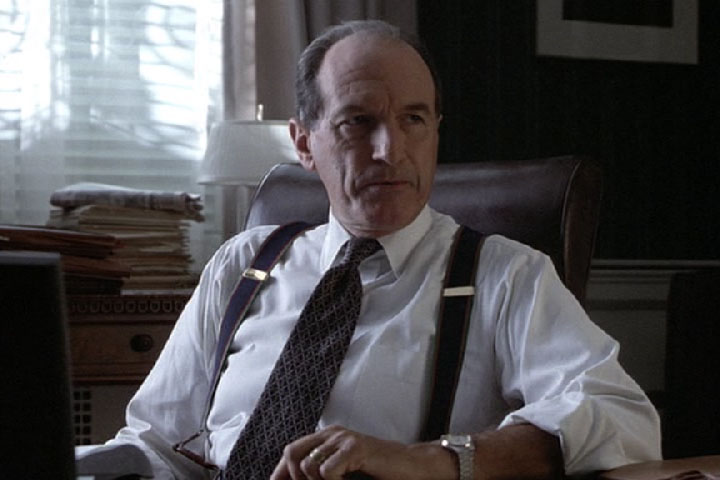
22. Campbell's accountant
Campbell accountant tells the detectives that Campbell had put together a syndicate to
purchase rare coins as an investment, mostly doctors and dentist,
promised them a 50% return on their money, and that Peterson was a member.
When the syndicate went broke, a lawyer went around collecting names for a lawsuit.
The detectives wonder if Peterson had visited Campbell to pick up his coins,
found them missing, and became angry.
They visit a restaurant where Peterson had dinner the evening of the murder.
According to the restaurant manager, Peterson ate there, and spent most of the time on his cellphone,
although there was a very pretty girl sitting with him.
They find the girl who was a woman reporter trying to interview Peterson.
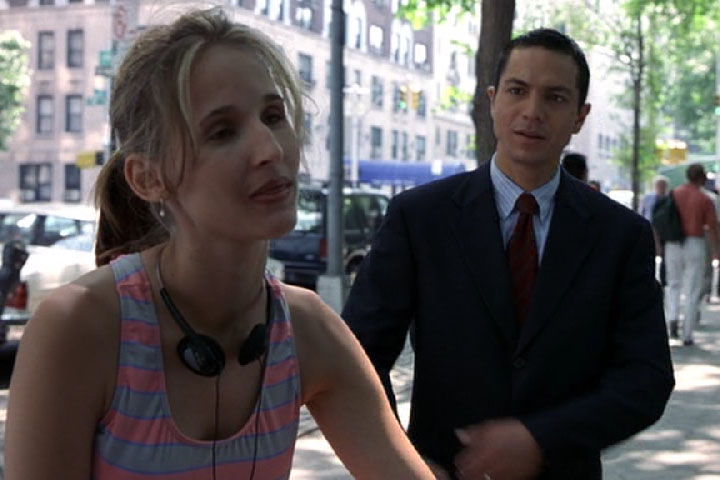
23. Reporter
She was impressed with his wealth but did not find him "scintillating."
All he talked about was "coins, coins, coins."
She invited him to her place for coffee, but he got a phone call and left her alone.
The detective report in to their chief that possibly Peterson left the restaurant, saw Campbell,
didn't find his coins in the gallery, and lost his temper.
They also figure that Peterson grabbed the Weimar commemoratives on the way out.
The detectives, armed with a search warrant, visit Peterson's apartment.
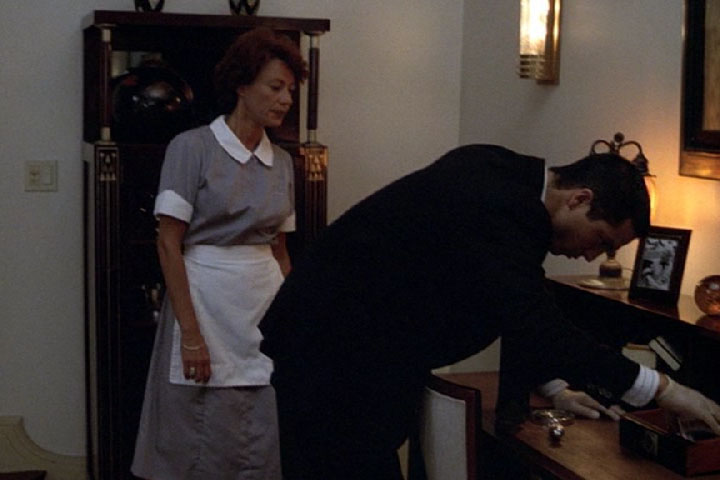
24. Peterson's apartment gets a going over
The detectives find the Weimar commemoratives as Peterson arrives upset.
They take Peterson to the police station for more questioning.
He tells the detectives that he left the restaurant to go to his apartment.
He talked to Campbell on phone to discuss a planned trip to Italy to look at some coins
dug up from a site near Cortona.
(Italy has laws against exporting ancient coins)
Peterson denies being the killer, that the coins were not worth that much,
"Why would I kill a friend over three percent of my net worth?"
Assisttant District Attorney Jamie Ross enters the picture.
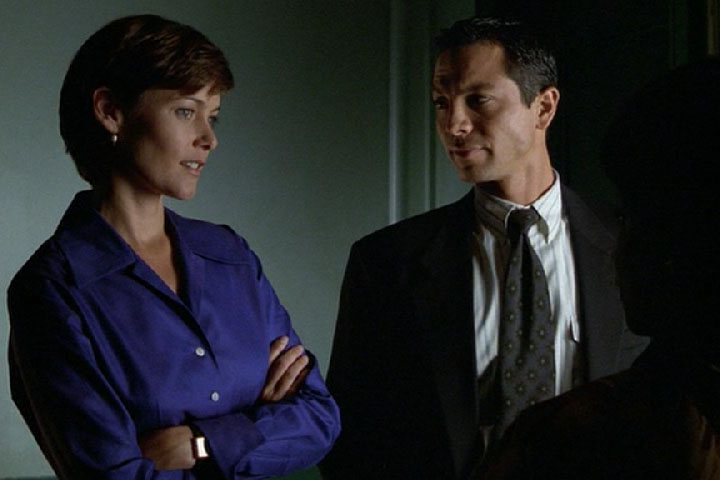
25. Jamie Ross and Curtis
Ross says that Campbell assistant has identified the "Weimars" from Peterson's apartment,
and that Peterson's fingerprints are all over the gallery safe, inside and outside.
The detectives then arrest Peterson for the murder.
Briscoe, who has previously disdained coin collecting, has apparently been reading about ancient coins,
he notes "did you know the ancient Greeks sometimes made coins of silver mixed with gold?"
In the District Attorney office, Peterson denies killing Campbell, and says that his fingerprints
would be at the gallery as he was there many times.
Peterson explains that the German Weimar coins were given to him by Campbell earlier
to settle a historical bet about what year the Romans under Claudius invaded England.
Apparently, Peterson apparently has an explanation for everything.
Back at Peterson's office, the detectives talk to his secretary.
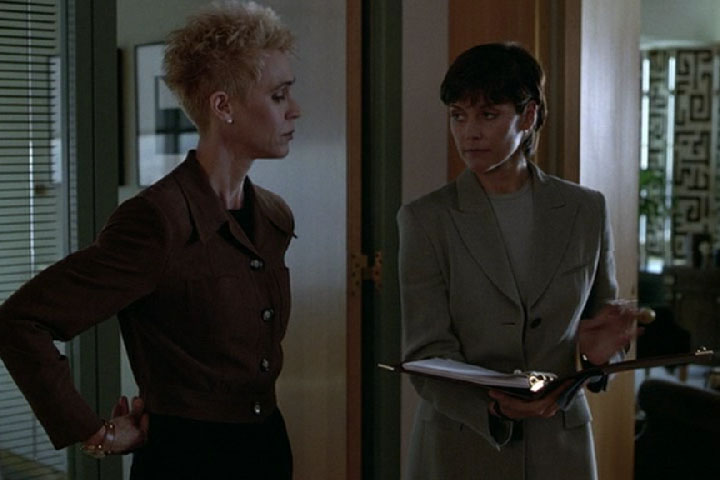
26. Peterson secretary and Jamie Ross
The detectives talk to Peterson's secretary who says that all of his telephone calls were logged,
and that a woman called three times about theHomage Magazinearticle,
saying that some of the coins, six "Roman Cleopatras" belonged to her family.
The secretary thought the caller was a crank but told her that Campbell had them.
The woman called again on the day of the murder, she "hot to see the coins",
and Peterson did take this call.
District Attorney Jack McCoy now appears, he is Jamie Ross's superior.
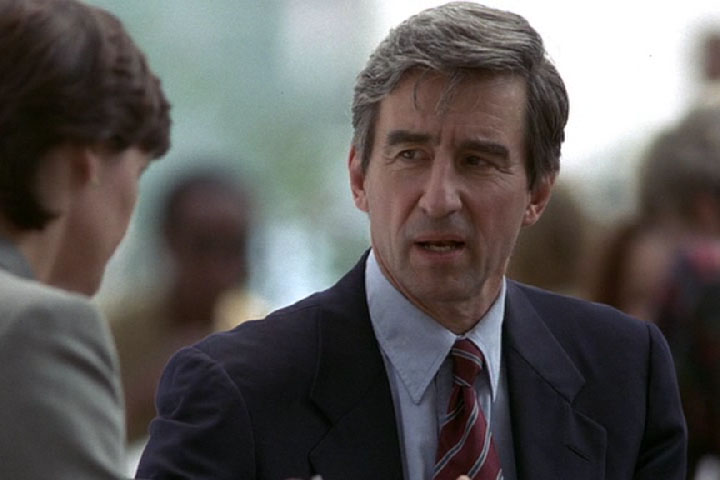
27. Jamie Ross and Jack McCoy
McCoy and Ross now want to talk to the Peterson caller to see if she got to see the coins.
If she called Peterson and told him Campbell didn't have coins, she would be a new star witness.
McCoy jokingly asks "all we have to do is take an ad in the Times,
unknown woman desperately seeking Roman Cleopatras, please contact Manhattan D.A.."
Ross remembers that she said they belonged to her family, maybe there's a record of the coins somewhere.
The detectives go to the "Numismatics Society" and ask a member about the coins.
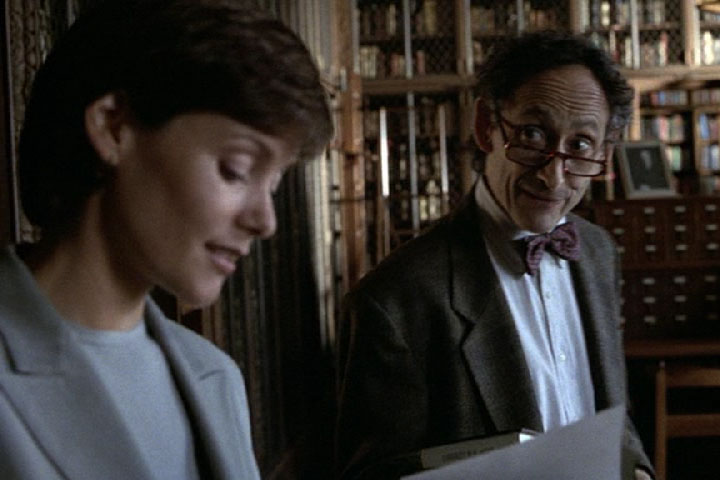
28. Ross and Numismatics Society member
The Numismatics Society member brings out a coin reference book and points to a coin.
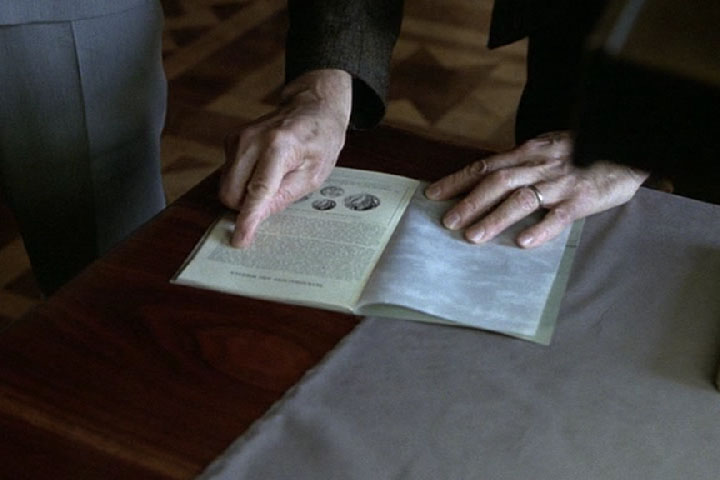
29. Numismatics Society member points to coin
Ross asks if it is the coin in question, a "Roman Cleopatra."
The man answers that it is Cleopatra, "lovely physique, don't you think?"
Ross asks him if he knows who owned Peterson's Cleopatras before he did, the man tells her
that only three sets are known in the literature, one in the Dutch Landesmuseum,
another belongs to the Rothschilds, and a third is in a private collection,
it was owned by an Isidor Schoenberg of Munich in 1935.
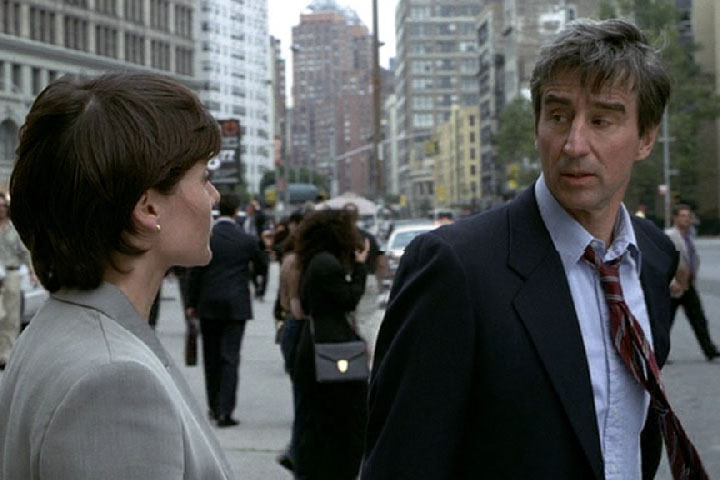
30. Ross and McCoy
Ross and McCoy have learned that the Dutch museum and Rothschilds still have their coins,
which leaves Isidor Schoenberg, who was a Jew in Germany in 1935.
They find out that he survived the Nazi persecution, came to New York City in 1948 as a displaced person,
and that six years later he joined the New York Numismatics Club.
Isador is dead, but his wife Ann is still alive, and lives in Washington Heights.
Ross goes to see her.
Mrs. Schoenberg wonders why someone is interested in the coins now, after so many years.
She tells Ross that her husband, trying to locate the coins, should have tried the District Attorney
as he tried everyone else, war reparations boards, Presidents Truman, Eisenhower, Kennedy.
Mrs. Schoenberg tells Ross that before the Nazis took power, Isidor's family was prosperous,
as they owned knitting mills in Germany.
Isidor bought the Roman Cleopatras at an auction in London in 1931, and Mrs. Schoenberg
gives Ross a copy of the original 1931 auction catalog.
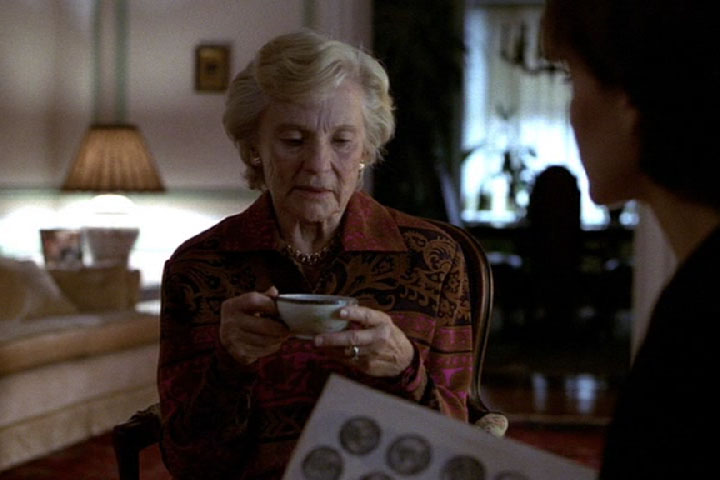
31. Mrs. Schoenberg talks to Jamie Ross
Isidor's father thought that Hitler was a buffoon, but Isidor wasn't so sure,
he took the coins to Switzerland and put them in a bank vault there.
Isidor returned to Munich as his family was there.
The Nazis killed all of the members except Isidor, who survived Auschwitz.
After the war, he went to Switzerland to try to get the coins from the bank,
but the bank turned him away because he had no documents.
Recovering the coins became an obsession with him.
Mrs. Schoenberg wanted Isidor to give up the search, she kept telling him that
"they tried to defeat us but we beat them, we lived, we had a child."
Ross asks the wife if she ever ever called a man named Richard Peterson about the coins.
She did not as she was not ever interested in them and would not have wanted them around.
Ross asks about her child, she is Judith, an art restorer, who uses her former husband's name Sandler.
Back at Peterson's office, Peterson explains that he doesn't have time to take phone calls from every lunatic,
however, McCoy says that this woman was at Campbells.
Peterson goes on that the woman was nervous, was ranting on about the Cleopatras.
Peterson realizes that she may have been the killer.
The detectives head back to the art restoration office and interview Sandler's manager.
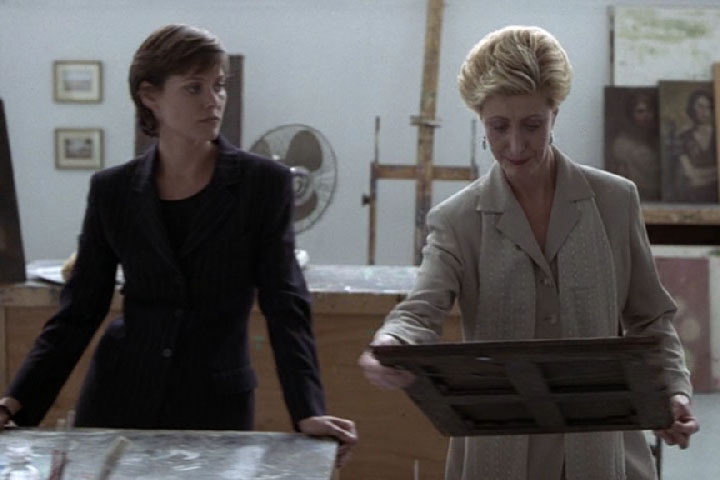
32. Art restoration manager
The detectives interview Judith's manager who tells them that Judith is a good worker
but has some problems; she doesn't like tight spaces like elevators, and becomes
extremely emotional about news stories about human suffering.
Judith usually works into the evening but was not at work on the night of the murder.
Judith didn't come to work that day and told her that a District Attorney
was harassing her mother, which Ross denies, telling her that the mother served her tea.
Ross asks if Judith is a difficult employee, the manager says that she is their best restorer.
Although Judith usually works late, she did not work on the evening of the murder.
The detectives head for Sandler's apartment and ask her if they could look around.
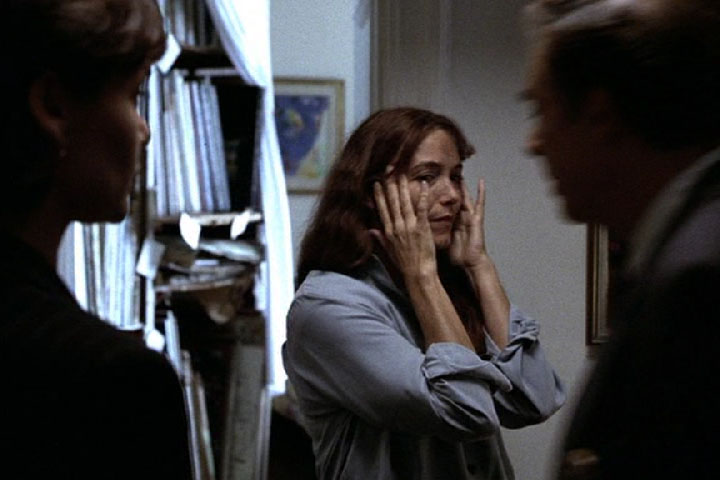
33. Judith in her apartment
Ross asks Judith if they can look around, and Judith asks for warrant,
Ross tells her she can get one and that the detectives will stay around until then.
They know why she went to Campbell gallery and that she lied to the police.
Judith finally lets them in, but threatens to file a complaint.
Briscoe asks if she has any coins, she doesn't but has coin magazines,
she also has the magazine with the Peterson article.
The police find ground green glass like the glass from the crime scene.
They arrest Sandler.
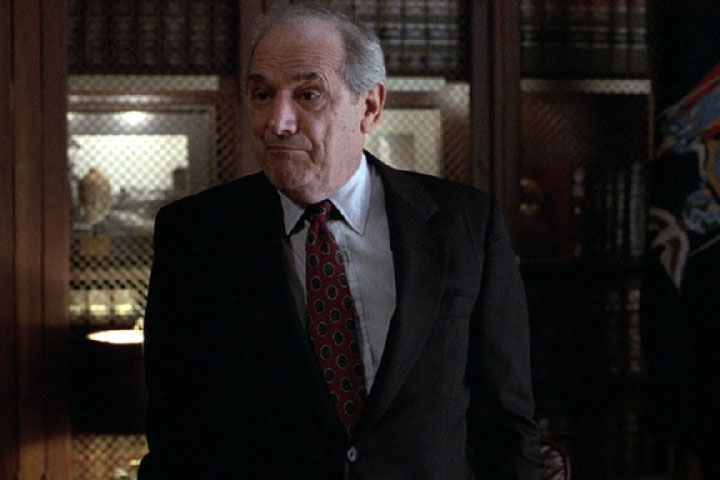
34. District Attorney Schiff
The head prosecutor District Attorney Schiff chews out his two assistants for arresting
two different suspects with different motives.
"Another day, another defendant"
Ross explains that the glass from Judith shoe is from Campbell's broken lamp,
and that both suspects were in the shop around the time of the murder.
Danielle Melnick is Sandler's attorney wants to throw out evidence from search.
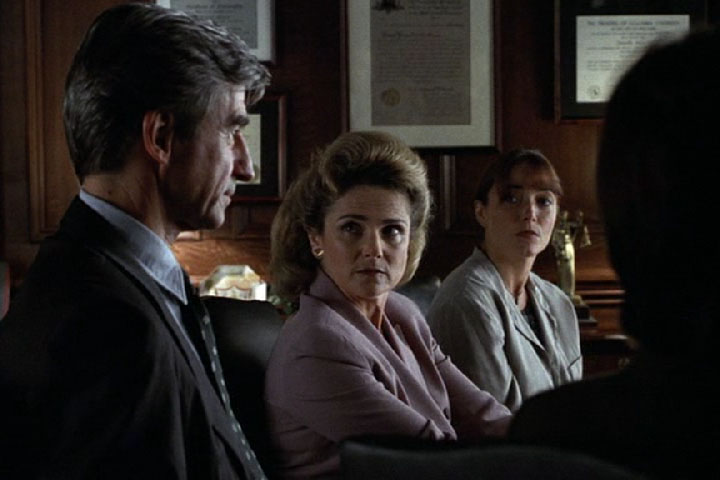
35. McCoy, Danielle Melnick, Sandler
The attorney reasons that since Judith is a child of Holocaust survivors, she would
have emotional problems and might not be able to give consent to a search.
McCoy then wants Sandler to be examined by their psychologist, Dr. Elizabeth Olivet.
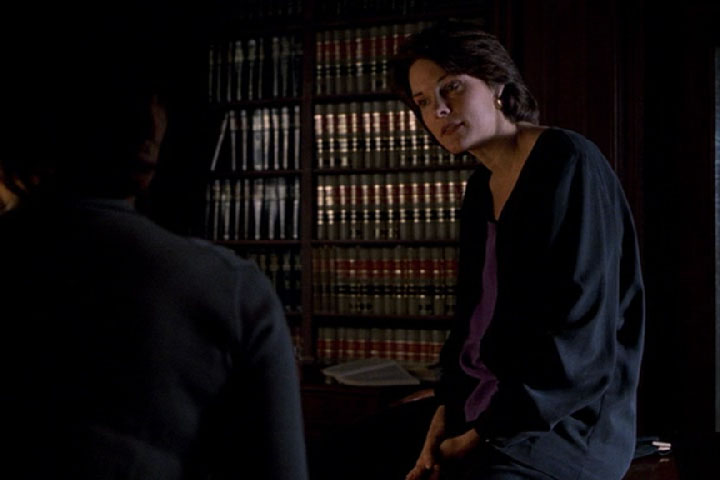
36. Olivet interviews Judith
The prosecutor's psychologist Dr. Olivet interviews Judith, she then tells the prosecutors
that Judith has mental problems common to children of Holocaust survivors,
including claustrophobia and depression.
She states that Judith gets upset about news stories on disasters.
Her parents did not talk much about their experiences, they wanted her to be an American girl,
reading Nancy Drew stories and visiting Radio City Music Hall.
She admitted to Dr. Olivet that her father talked about his coins, that they mattered to him,
they were more than "a few pieces of metal."
They were symbols of his losses, his family, his business, his family house, his dogs,
and he wanted to get one thing back.
She wanted to avenge what was done to her parents by the Nazis.
Ross doesn't buy this excuse because Campbell wasn't a Nazi, he was a coin dealer.
But, according to Dr. Olivet, Judith was thinking about the things her father lost to the Nazis.
A court hearing is set to decide if the police search of Judith's apartment was legally valid.
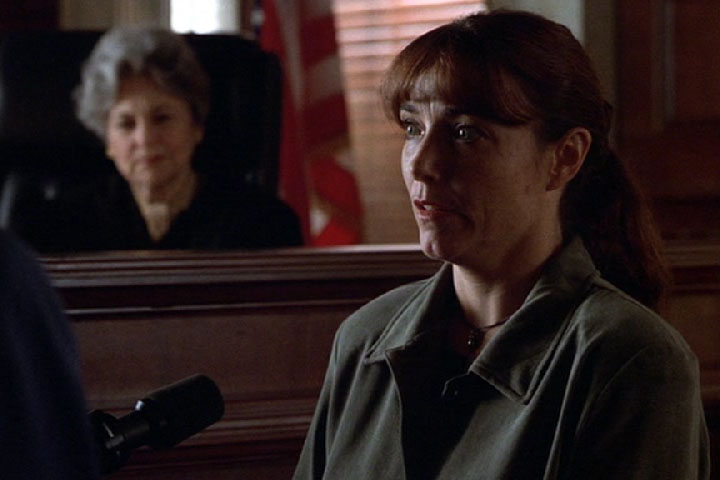
37. Judith testifies in court
Judith testifies that she didn't want the police in her apartment and that they forced their way in.
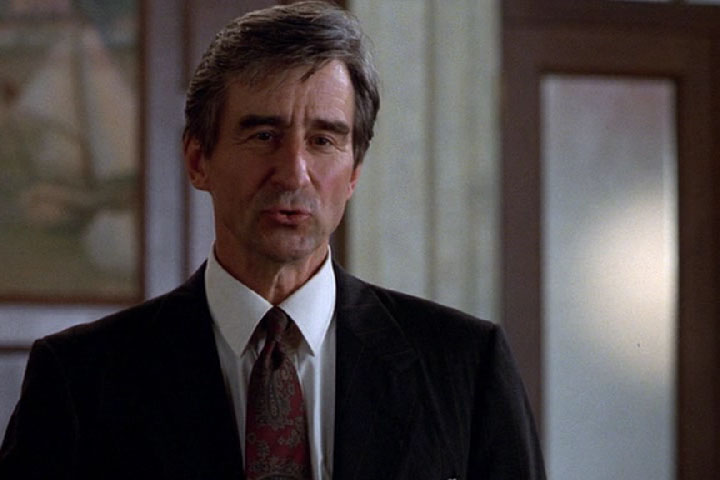
38. McCoy questions Judith
McCoy replies that "we have laws here, Miss Sandler, we have rules."
Judith then comes back with "they had laws in Nazi Germany, too."
The judge sides with Judith and does not allow the apartment search to be used in a trial.
Meanwhile, D.A. Schiff drops the murder charge against Peterson.
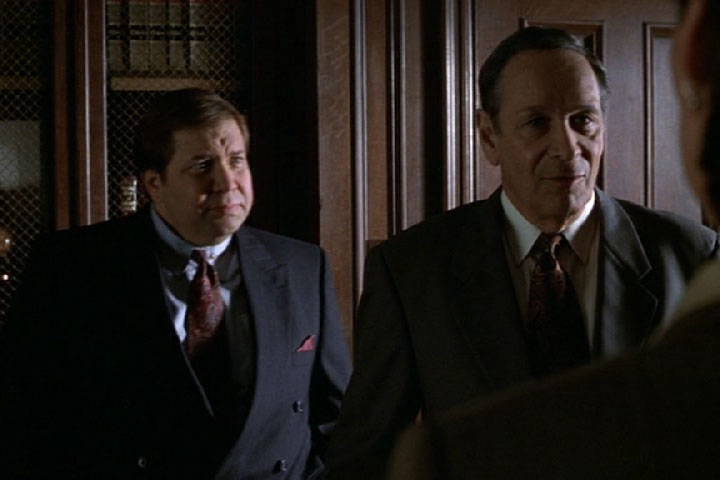
39. Charges dropped
The prosecutors have dropped the murder charge against Peterson, but they do not believe his story.
Ross wonders why Peterson did not ask about his coins after the dismissal.
The police never found Peterson's coins, they searched Judith's apartment, her mother's apartment,
her studio, and her "treasure chest."
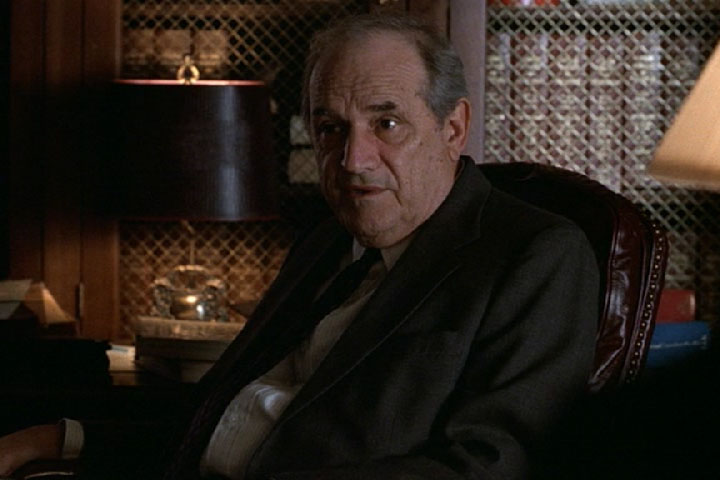
40. Schiff asks the question
Schiff finally asks the question:
"Has anybody ever seen these famous coins?"
Ross heads out to interview an official of the bank who loaned Peterson the money.
He says he never saw the coins, every time he asked to he got a different excuse,
first that they were "being appraised", then "taken to Europe."
The banker admits that he never saw the collection, but that if his bank had turned
Peterson down for a loan, other banks would have loaned him the money.
Ross realizes that nobody at the bank ever saw the collateral for a $20 million loan.
She later tells McCoy that she will close her account there.
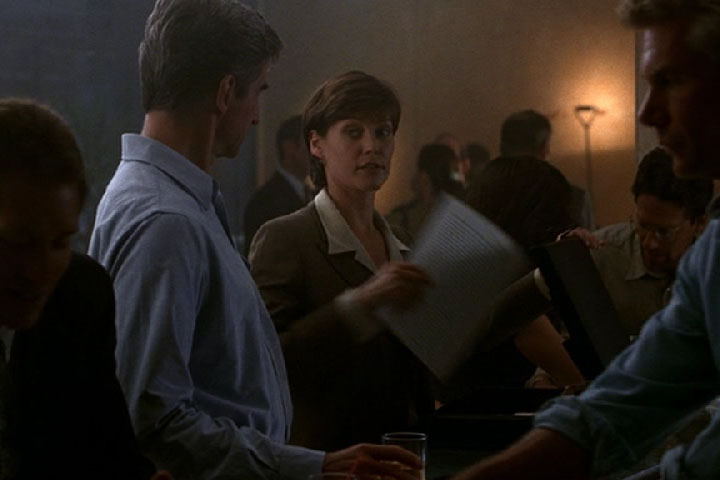
41. Ross and McCoy in a bar
McCoy wonders if Peterson just made up the coins he supposedly owns.
Ross shows McCoy the 1931 catalog and suggests that he used one like it as a "crib sheet."
The prosecutors meet with Peterson and his attorney.
McCoy suggests that Sandler and Peterson murdered the dealer together.
Peterson claims that he never met Sandler, McCoy reminds him about the mystery calls from a woman,
Peterson then accuses Sandler of killing the dealer and taking his coins.
The police searches have failed to connect Sandler with the coins.
At a meeting of the prosecutors, attorneys, Peterson and Sandler, McCoy asks Peterson why he
never told the police that a woman called him on the day of the murder, and why he is covering for her?.
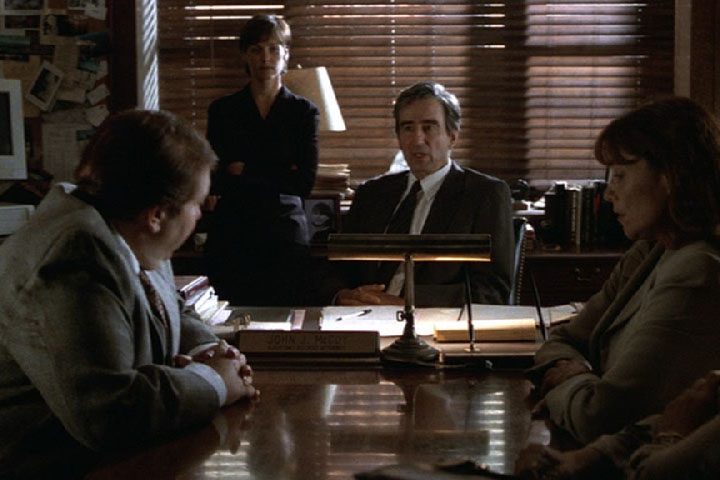
42. Peterson and Sandler in D.A.'s office
Peterson says that just because the police can't find them, it doesn't mean she doesnt have them.
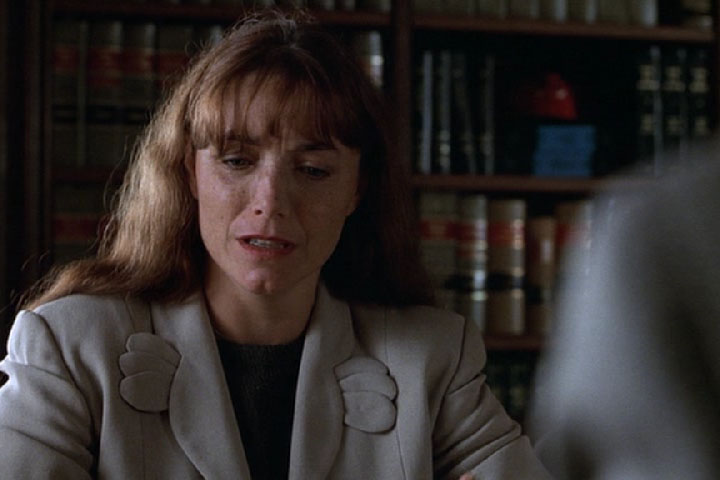
43. Judith
McCoy asks Sandler if she does have her father's coins.
Judith replies that no, she doesn't.
Danielle asks McCoy what is this all about?
McCoy replies "A miracle, Danielle."
McCoy then asks "Where did you buy those coins, Mr. Peterson?"
Peterson replies "From a collector in Austria, he must have gotten them from that Swiss bank."
McCoy then asks about the rest of his "special collection."
Peterson tells him "from various sales."
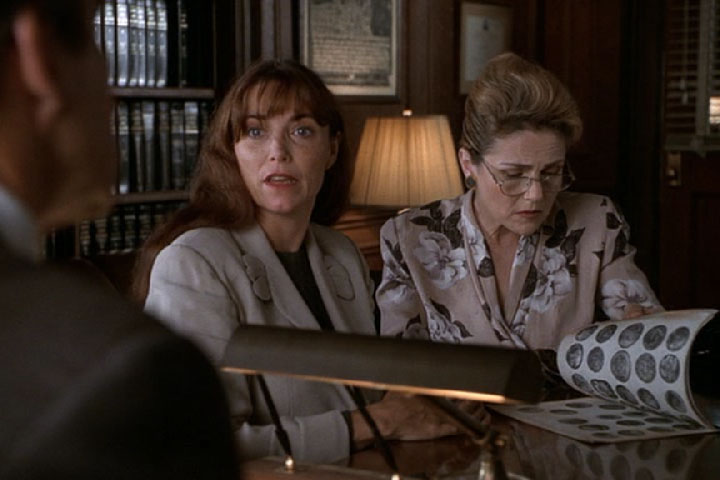
44. Judith, Danielle, and auction catalog
McCoy hands Danielle the catalog and Judith asks McCoy where he got it.
McCoy says "from your mother."
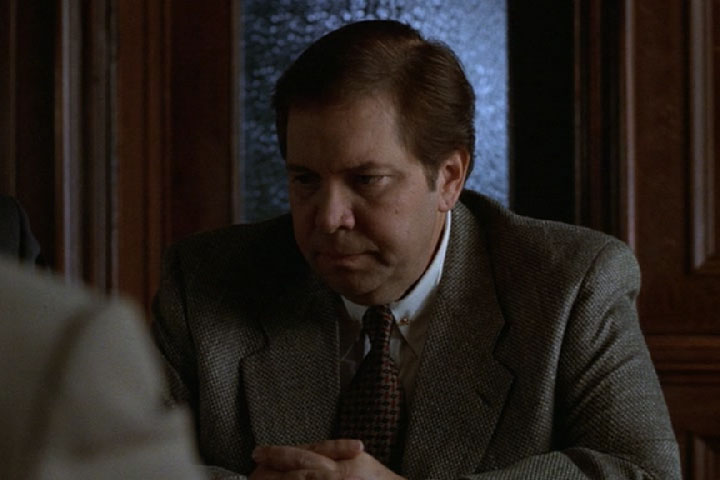
45. Peterson, sorry
McCoy then states that in 1931, 20 auction lots were sold to 20 different buyers
scattered all over Europe.
"What are the odds of reassembling all those lots 65 years later in a single collection?"
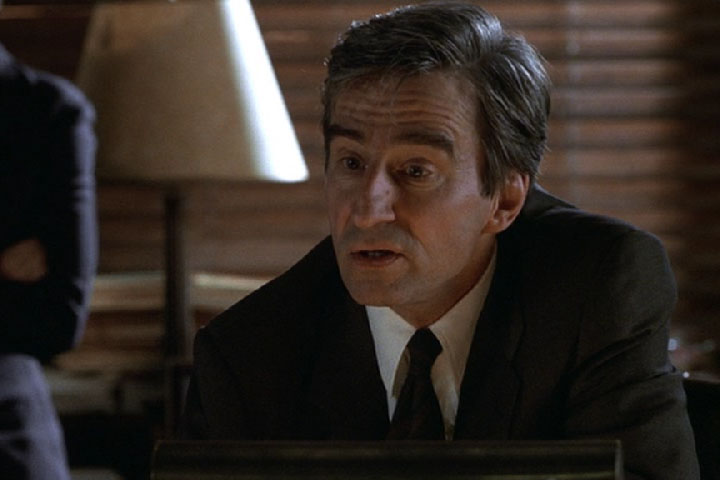
46. Judith looks at the catalog
McCoy asks "A million to one, a billion to one?"
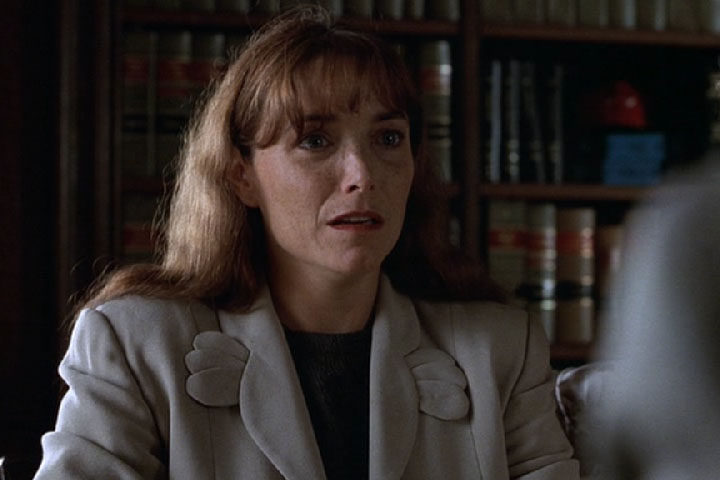
47. Judith asks
Judith asks if Peterson said he had all these coins.
McCoy replies with a copy of Peterson's insurance inventory.
She cries "it was all a lie, you never had my father's coins."
McCoy tells Peterson that he has committed a fraud.
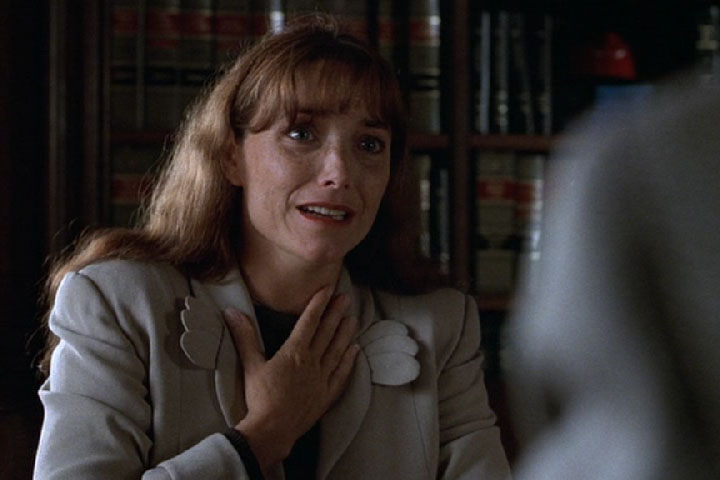
48. Judith, "he was lying for you"
"That's why Campbell wouldn't show them to me, he was lying for you, oh God!."
Peterson confesses that it was just an old auction catalog that he found at the library,
"I never meant for anyone to get hurt."
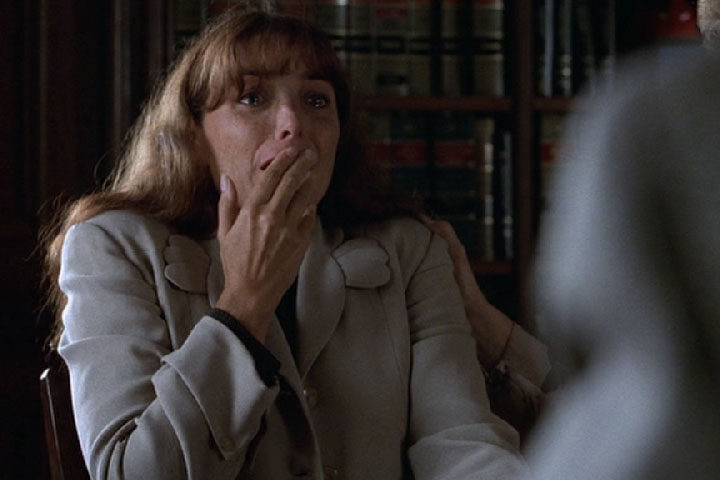
49. Judith, "you bastard!"
Judith replies "you bastard!."
Peterson's attorney asks McCoy for deal on the fraud case, McCoy replies that will talk to
the U.S. attorneys.
Peterson continues, "she was calling me, calling Stephen."
They were afraid that she would expose Peterson's fraud.
The men were going to meet her that night at the gallery and try to buy her off,
but when Peterson arrived there, he found Campbell dead.
Peterson, "I didn't want you to find her, I didn't want to lose everything."
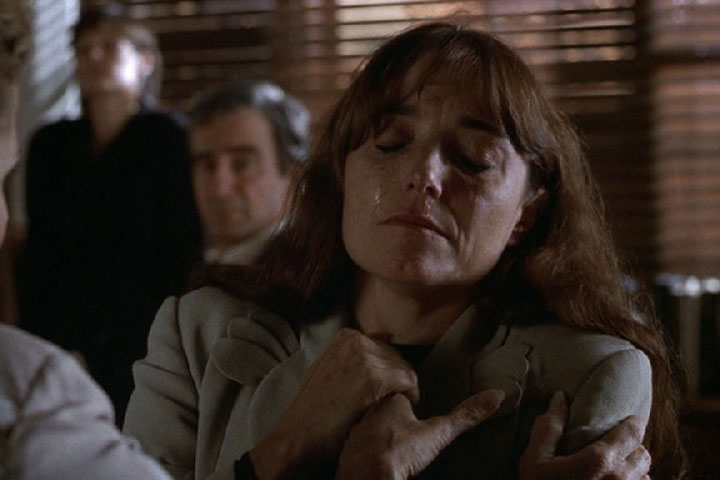
50. Judith, "I killed a man for nothing"
Judith cries "I killed a man for nothing!, for nothing!."
Her attorney tries to quiet her down, but she continues, "what does it matter, I killed a man for nothing."
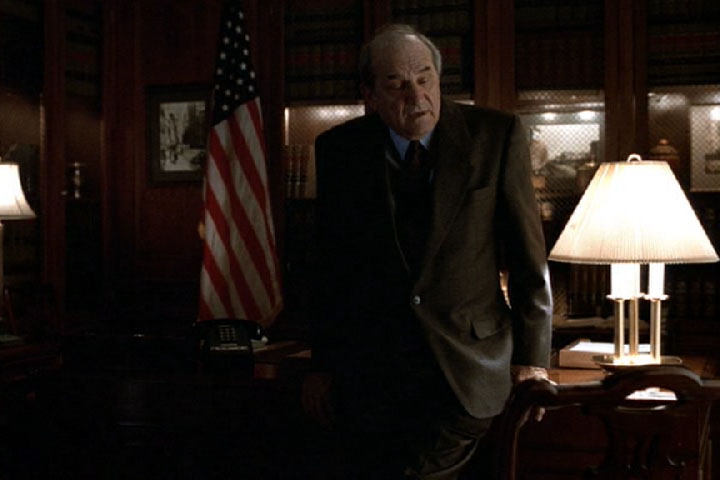
51. Schiff in office
Schiff reports that the U.S. Attorney closed a deal with Peterson, he will do five years at
"Club Fed" (a minimum-security prison).
Ross reports that their office let Sandler plead guilty to manslaughter and she will go to prison
for eight to 25 years.
Schiff, "and our Swiss banker friends who stole the coins in the first place, what refugees
are they taking deposits from now?"
Cast, Directors, Writers:
Karen Allen as Judith Sandler
Jerry Orbach as Detective Lennie Briscoe
Benjamin Bratt as Detective Rey Curtis
S. Epatha Merkerson as Lt. Anita Van Buren
Sam Waterston as Jack McCoy
Carey Lowell as A.D.A. Jamie Ross
Steven Hill as D.A. Adam Schiff
Tovah Feldshuh as Danielle Melnick
Larry Keith as Francis Dunlap
Director: Vincent Misiano
Writers: Dick Wolf, Barry M. Schkolnick
Benjamin Bratt as Detective Rey Curtis
S. Epatha Merkerson as Lt. Anita Van Buren
Sam Waterston as Jack McCoy
Carey Lowell as A.D.A. Jamie Ross
Steven Hill as D.A. Adam Schiff
Larry Keith as Francis Dunlap
Writers: Dick Wolf, Barry M. Schkolnick
| Prev | Back | Next |